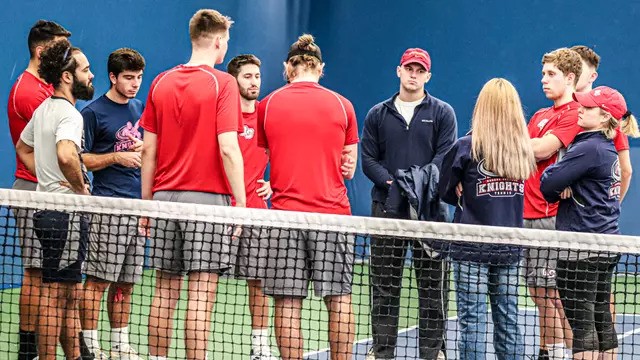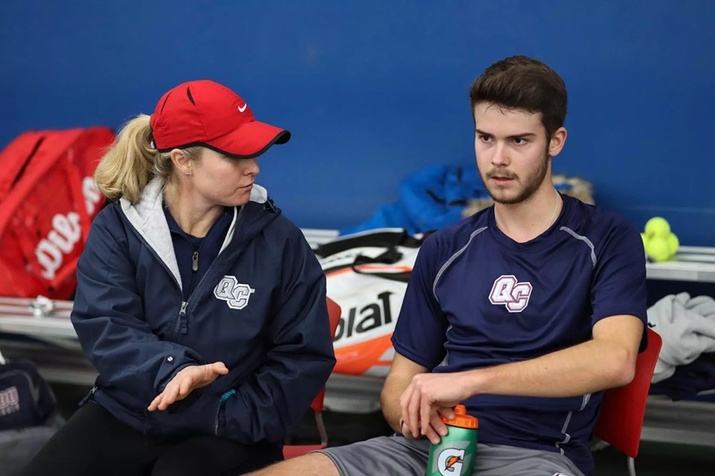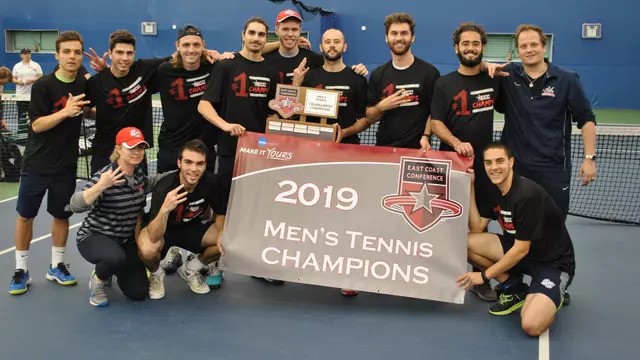On the planet of collegiate sports activities teaching, stepping onto the courtroom as a lady answerable for a males’s tennis workforce isn’t nearly technique and talent—it’s about difficult perceptions and breaking by way of boundaries which have lengthy outlined the sport. For me, this transformative journey started on the sun-drenched courts of South Africa, the place my love for tennis first took root and the place I realized early on that nothing comes straightforward and gender ought to by no means restrict the pursuit of your goals in the direction of excellence.
From a younger age, tennis was greater than only a recreation; it was a ardour that ignited a fireplace inside me to compete, coach, and lead. Rising up in South Africa, I spent numerous hours hitting balls towards the storage door, dreaming of sooner or later enjoying competitively. These early moments formed my path and instilled a deep-seated willpower to achieve the game I liked.
Moving into teaching wasn’t nearly pursuing a profession—it was about advocating for inclusivity, demonstrating that efficient teaching transcends gender, and exhibiting that ladies can excel in roles historically held by males. Every step ahead, from participant to educate, was pushed by a ardour to redefine what’s attainable and encourage others to pursue their goals with out limitations based mostly on gender.
As I progressed by way of my very own enjoying profession and made the transition into teaching, I quickly got here to comprehend the placing actuality of teaching collegiate sports activities: the sector, particularly in teaching males’s groups, was overwhelmingly dominated by males. This consciousness gave me the motivation and willpower inside to not solely set up my place on this panorama but additionally to create alternatives for different ladies aspiring to enter teaching.

Seeing predominantly male teaching staffs throughout collegiate sports activities motivated me to problem the established order. I believed then, as I do now, that variety in teaching enriches the game, bringing completely different views and approaches that profit athletes and groups alike. My journey wasn’t nearly private achievement; it turned a mission to interrupt down boundaries and pave the way in which for extra gender variety in sports activities management.
The trail to securing the place was laden with challenges. Through the rigorous interview course of, delicate hints of skepticism about my means to deal with a males’s squad raised within the type of analytical questions. But, every inquiry served as a platform to articulate my imaginative and prescient for the workforce’s success and description my strategic method to attaining it. I stood agency in my perception that my gender ought to by no means be a deterrent however relatively a testomony to my distinctive perspective and training prowess.
My journey as a coach started as aiding a ladies’s workforce, offered invaluable expertise in cultivating expertise, constructing workforce cohesion, and fostering a supportive surroundings. It was a foundational step in my teaching journey, the place I realized the intricacies of management and participant growth. Nonetheless, as I gained confidence and expertise, I felt compelled to hunt new challenges. When the chance arose to educate a males’s workforce, I noticed it not simply as a profession development but additionally as an opportunity to interrupt down stereotypes and present that efficient teaching transcends conventional gender roles and expectations.
Stepping onto the courtroom as the top coach of a males’s school tennis workforce felt each exhilarating and daunting. The gamers have been proficient and pushed, desperate to excel beneath my steerage. But, behind their enthusiasm, I sensed the unstated doubts about whether or not a lady may make them victory. It was a problem to earn their respect and to show that my gender didn’t outline my teaching prowess.
One of many biggest hurdles was navigating the steadiness between authority and approachability. As a lady teaching males, there’s a positive line to stroll—asserting management with out coming throughout as overbearing, demanding respect with out compromising on requirements. I discovered that establishing clear communication and mutual respect have been key. It was about constructing relationships based mostly on belief and demonstrating that my gender didn’t dictate my means to strategize, encourage, and lead. It was about constructing relationships based mostly on belief and demonstrating that my gender didn’t dictate my means to strategize, encourage, and lead.

Speaking to different coaches, each women and men colleagues alike, I encountered differing viewpoints. Some male coaches expressed doubts about my capability to command respect and handle the aggressive dynamics inherent in males’s collegiate tennis. Many raised considerations about whether or not my teaching type would resonate with male athletes, given the variations in communication and management kinds typically related to gender. Their considerations underscored the pervasive stereotypes that also dominate sports activities teaching, highlighting the skepticism in the direction of ladies in management roles in male-dominated sports activities and the power to command respect and deal with the aggressive nature of males’s school tennis.
When talking to most feminine coaches they have been hesitant to educate males’s tennis groups resulting from numerous societal and cultural components. Traditionally, sports activities teaching, particularly for males’s groups, has been dominated by males, perpetuating a stereotype that teaching males requires a selected confidence and authoritative demeanor that some understand as extra naturally becoming to male coaches. This stereotype is creating uncertainties in feminine coaches and their means to command respect and successfully handle the dynamics of a males’s workforce. Moreover, the shortage of illustration of girls in teaching roles for males’s sports activities reinforces the notion that teaching males is an unconventional path for ladies. Cultural expectations and deep-seated gender norms additional contribute to the unwillingness, as ladies might internalize societal beliefs about roles and capabilities in sports activities management. Regardless of these challenges, many ladies have efficiently overcome these boundaries, proving their competency and paving the way in which for higher gender variety in teaching roles throughout all ranges of sports activities.
Then again, there have been a couple of feminine coaches who supplied steadfast help and solidarity, sharing their very own experiences of breaking into historically male-dominated fields. They emphasised the significance of perseverance and willpower in navigating the challenges forward specializing in solidarity and encouragement, sharing their experiences of breaking into male-dominated fields, and providing methods for navigating the challenges forward. Their encouragement was invaluable, offering insights into efficient methods for constructing belief and fostering a constructive workforce tradition. This numerous vary of views – from skepticism to help – underscored the complexities of gender dynamics in collegiate sports activities teaching and strengthened my dedication to breaking down boundaries and paving the way in which for higher gender fairness within the area.
The chance to educate a males’s workforce was given to me by a lady ready of nice affect who acknowledged my potential to steer a profitable program. This gesture strengthened my perception that mentorship and help from ladies in energy are essential in empowering the subsequent era of feminine coaches.
In private expertise taking the helm as the top coach of a males’s school tennis workforce was each exhilarating and daunting. Each observe, match, and season offered a chance to problem stereotypes and redefine expectations. Past the technical and strategic features of teaching, I discovered myself navigating the complexities of management, striving to strike a steadiness between authority and approachability. Constructing belief and fostering open communication turned paramount as I labored to earn the respect of my gamers and friends alike.
Statistics underscored the disparity: solely a fraction of collegiate tennis coaches are ladies, and even fewer maintain positions teaching males’s groups. This actuality added weight to my function—not simply as a coach, however as a trailblazer. In response to latest knowledge, ladies make up simply 26% of head coaches in NCAA Division I males’s sports activities, highlighting the rarity of girls in management roles on this area. Regardless of these odds, my presence on the courtroom was a each day reminder that teaching prowess transcends gender.

Just some years in the past, I discovered myself in a novel place as the one feminine coach devoted solely to a males’s workforce in your complete nation. Being a trailblazer on this regard motivated me to advocate for extra alternatives for ladies in teaching roles, highlighting the significance of inclusivity and breaking down boundaries within the sports activities business.
Along with teaching, I function the Nationwide Rating Chair for Males’s D2 Tennis, overseeing the rating course of and guaranteeing equity and accuracy in collegiate tennis competitions. This function has not solely allowed me to contribute to the game at a broader stage but additionally highlighted the significance of variety in teaching.
Extra ladies are getting into teaching roles in collegiate sports activities, and the dialog about gender fairness in athletics continues to evolve. The trail forward stays difficult, however the strides made—and the victories gained—function a testomony to the ability of perseverance and perception in a single’s talents.
Teaching a males’s school tennis workforce wasn’t merely a job; it was a platform to advocate for gender fairness and inclusivity in sports activities management. The successes we achieved on the courtroom served as a strong testomony to the impression of variety in teaching. Every victory, every milestone, turned a stepping stone towards a future the place gender doesn’t dictate alternative or achievement.
There have been moments of doubt, instances when the strain to carry out appeared amplified by the scrutiny positioned on my gender. But, with every passing season, victories mounted, and perceptions shifted. The workforce’s success beneath my steerage spoke volumes, difficult the notion that males’s sports activities are solely coached by males.
Ultimately, we have to look past the victories on courtroom, teaching tennis is a platform to encourage change. I noticed firsthand how my presence motivated younger ladies to contemplate teaching careers and inspired younger males to embrace gender fairness in sports activities management. It wasn’t nearly teaching; it was about being a job mannequin, about exhibiting what’s attainable when ardour, talent, and willpower converge.
In the present day as I mirror on my journey, I’m reminded of the progress made and the work nonetheless forward. Extra ladies are getting into teaching roles in collegiate sports activities, but the trail stays difficult. By sharing my story and experiences, I hope to encourage others—each women and men—to problem boundaries, embrace variety, and champion equality in sports activities and past. Teaching a males’s school tennis workforce wasn’t nearly profitable matches; it was about breaking boundaries and paving the way in which for a extra inclusive future in sports activities teaching. As I proceed to steer and encourage, I hope my story encourages others to problem boundaries, embrace alternatives, and pursue their passions, no matter gender.

